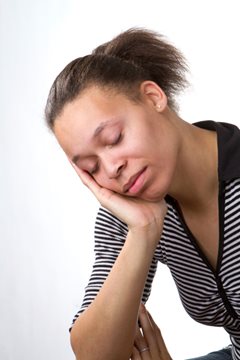Healthy Living
Tips for Tackling Tiredness
Fatigue is a common problem for many people and a common reason for seeing a doctor. UR Medicine Primary Care’s Dr. Laura Gift shares tactics for tackling five common energy-sapping culprits.

Fatigue is defined as extreme tiredness. It’s different from sleepiness, which is described as difficulty staying awake, frequent yawning, and feeling like you need to lie down and rest.
Fatigue also is different from lack of interest or enjoyment in activities, which may be a sign of depression but sometimes overlaps with fatigue. Your doctor can help address fatigue, tiredness and depression.
While it's important to see your doctor regularly, here are five ways to address some common reasons for fatigue:
- Don’t bilk your bed time: The old adage tells us that eight hours of sleep rounds out a perfect day. In fact, healthy adults can require anywhere from six to 10 hours of sleep a night. With our hectic schedules, we often don’t give ourselves enough time to sleep. Do you clock enough bed time? Start by figuring out what time you need to get up in the morning. For example, if you rise at 6 a.m. and do well with eight hours of sleep, you should be asleep by 10 p.m. Plan to give yourself a full 30 minutes to fall asleep. That means you should be in bed with the lights off by 9:30 p.m.
- Identify the interruptions: Waking during the night can sap your energy during the day. What’s waking you up? If it’s environmental—for example, humming traffic or noisy neighbors—consider sleeping with a fan or a white-noise machine. Do not sleep with the TV on. TV sound varies between programming and commercials and that will disrupt your sleep even if you aren’t aware of it. If you’re waking up to urinate, talk to your doctor about it. It can be a sign of an underlying health condition. However, many people get up at night to urinate because they drink too much fluid before bed. Stop drinking two to three hours before you go to bed (although it’s fine to take sips of water with nighttime medications).
- Step up your exercise: While it may seem like a contradiction, you can be tired because you don’t get enough exercise. A 2005-2006 report based on the National Health and Nutrition Examination Survey showed a correlation between getting the recommended 150 minutes of exercise a week and decreased daytime sleepiness, as well as improved concentration when tired.
- Find foods that fuel you: Poor nutrition can leave you sluggish. Eating a diet of high glycemic index foods—foods with simple, quickly digested carbohydrates that rapidly increase blood sugar—causes your body to produce more of the hormones insulin and cortisol. This changes the metabolic balance in your body and, as your blood sugar drops, causes you to feel tired and want to eat more carbs/sugar for energy. Eating a diet with whole gains and natural fiber balanced with protein will keep your blood sugar stable and keep you feeling fuller longer and not feeling tired between meals.
- Tame your tension: It’s important to consider the emotional aspects of fatigue. Feeling on edge or stressed, having a lot on your mind, or constantly thinking of things you need to do can make you feel physically tired. Take time every day to do something you enjoy, even if it’s only for a few minutes. And stay connected with family and loved ones who are a source of positive support. Making a list on paper may help you stop running your to-do list in your head. If you are struggling with managing stress or too much anxiety, make an appointment to see your doctor.

Laura E. Gift, D.O., is a family medicine physician with UR Medicine Primary Care's Medical Associates of Penfield.

